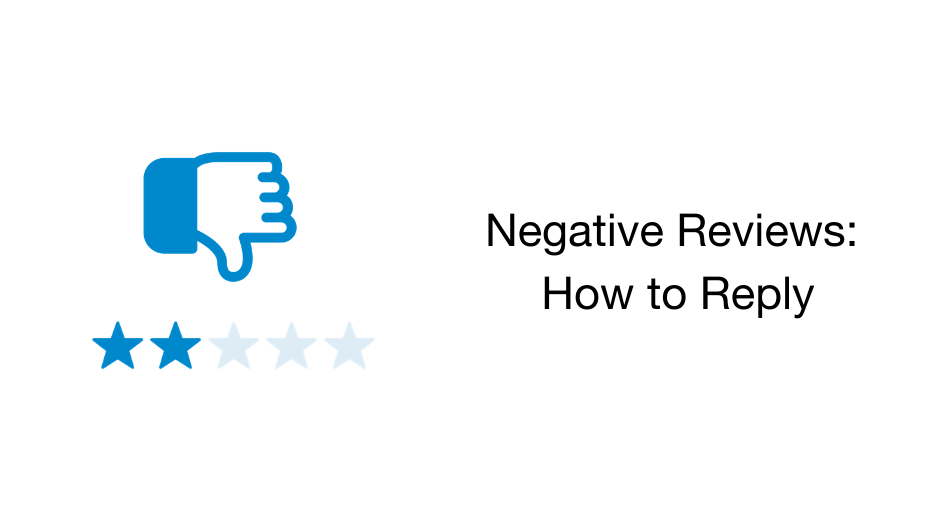
No one likes negative reviews online, especially about their business. A client has just left you a negative online review on Google Reviews or Facebook. How should you react? Should you respond?
In an offline context, how you respond to a customer only affects the unsatisfied customer. However, in an online context, some potential customers will read the negative reviews and your reply. A lot of customers rely on online reviews to make purchase decisions.1 How you reply to negative comments can impact potential customers’ attitudes towards your business and whether they recommend it or not.
Our blog article, Why Online Reviews Are Important for Your Business explained the benefits of online reviews. While the majority of our professionals have an overall rating of over 4 stars on Google Reviews and Facebook, no one is, unfortunately, protected from negative comments.
Response Strategies to Negative Online Reviews
In their study, Dens, De Pelsmacker, and Purnawirawan give a nuanced answer to the question.2
There are six response strategies, depending on the context:
- No response
- Refutation
- Apology only
- Apology + prospective explanation
- Apology + compensation
- Apology + prospective explanation + compensation
While most service providers will usually not respond to negative online reviews, that isn’t always the best solution.3
Here are the different response strategies to negative online reviews explained:
|
No response
|
When the service provider doesn’t respond explicitly to the negative review, either intentionally or because they are not aware of it.
|
|
Refutation
|
When the service provider denies the situation.
|
|
Apology
|
When the service provider acknowledges the problem and assumes responsibility.
|
|
Prospective explanation
|
When the service provider promises that the issue has been fixed and will not happen again.
|
|
Compensation
|
When the service provider provides monetary compensation.
|
Based on this study, your response strategy will depend on your positive vs. negative reviews ratio. This ratio influences how potential clients assess you as a professional or as a business.
Scenario 1: Most reviews are positive

If your objective is a) to enhance positive attitudes and support intentions, you should not respond. The study showed that there was no significant difference in people’s attitudes and support intentions toward the service provider across all response strategies.
Therefore, opting for the least laborious response strategy makes sense. However, if your objective is b) to spread positive word of mouth, you should provide an apology, a prospective explanation, and compensation.
Scenario 2: The balance between positive and negative reviews is neutral

People may have doubts about who is accountable (either your business or the dissatisfied customer). Therefore, the impact on others’ attitudes is less severe.
If your objective is a) to enhance positive attitudes and support intentions, you should provide an apology and a prospective explanation. However, if your objective is b) to spread positive word of mouth, you should provide an apology, a prospective explanation, and compensation.
Scenario 3: Most reviews are negative

People will most likely hold you or your business accountable. Therefore, more efforts are required from you. You should provide an apology, a prospective explanation, and compensation.
You may be wondering: "What about the refutation strategy?" Well, it might be the worst strategy to adopt for neutral and negative review equilibrium. Although refutation is an acceptable strategy to use when the review balance is positive, it is not effective in encouraging positive word of mouth.4
Previous studies found that the use of refutation was perceived as a lack of empathy by the readers. It also gave more credibility to the person leaving the critique.5 Consequently, it is suggested to opt for the no response strategy, or the apology, prospective explanation, and compensation strategy, based on your objective.6
Understanding The Negative Online Review First
While the article from Dens, De Pelsmacker, and Purnawirawan didn’t mention this aspect, we would like to share an experience we’ve had with a bad review at GOrendezvous.
When GOrendezvous only had a few reviews on Google, an unhappy client left a rating of 1 out of 5 on Google Reviews from his and his wife’s account. We all know, one bad comment can make your average review score drop drastically. Our founder tried to understand the situation.
After a 45-minute phone call and a couple of emails later, he still wasn’t able to resolve this issue. Still, this was a misunderstanding. Our founder ended up explaining to the client the impact his reviews had on the business: two potential clients had recently mentioned that they were worried about our service after seeing the bad evaluations online.
Taking time to talk one-on-one with the unhappy client can help. The client ended up changing his review. In fact, as an entrepreneur himself, this conversation made him realize that the reviews he wrote under impulse could hurt a business and its employees.
It happens to us all, when we are angry, we do not necessarily think before talking or sending a message. This can happen to your clients as well. In scenarios 2 and 3, it can be helpful to take time to understand your client’s bad review first. If you have a conversation, you may not even need to use the response strategies.
Conclusion
In summary, more negative feedback means more efforts to improve positive attitudes, support intentions, and positive word-of-mouth. While this study looked at the attitudes and intentions of readers, not disgruntled customers, they were shown to also reflect those of the customer who wrote the review.
On a final note, don’t let negative reviews scare you. Encouraging your customers to leave reviews can help your business. Now you know which strategy to choose in the advent of a negative review. If you haven’t read our blog article on Why Online Reviews Are Important for Your Business, we encourage you to do so.
1 Hennig-Thurau, T., Malthouse, E. C., Friege, C., Gensler, S., Lobschat, L., Rangaswamy, A., & Skiera, B. (2010). The impact of new media on customer relationships. Journal of service research, 13(3), 311-330.
2 Dens, N., De Pelsmacker, P., & Purnawirawan, N. (2015). “We(b) care” How review set balance moderates the appropriate response strategy to negative online reviews. Journal of Service Management, 26(3), 486-515.
3 Dens
4 Dens
5 Kerkhof, P., Utz, S. and Beukeboom, C. (2010). The ironic effects of organizational responses to negative online consumer reviews, Proceedings of the 9th International Conference on Research in Advertising (ICORIA), Madrid, June 25-26.
6 Dens